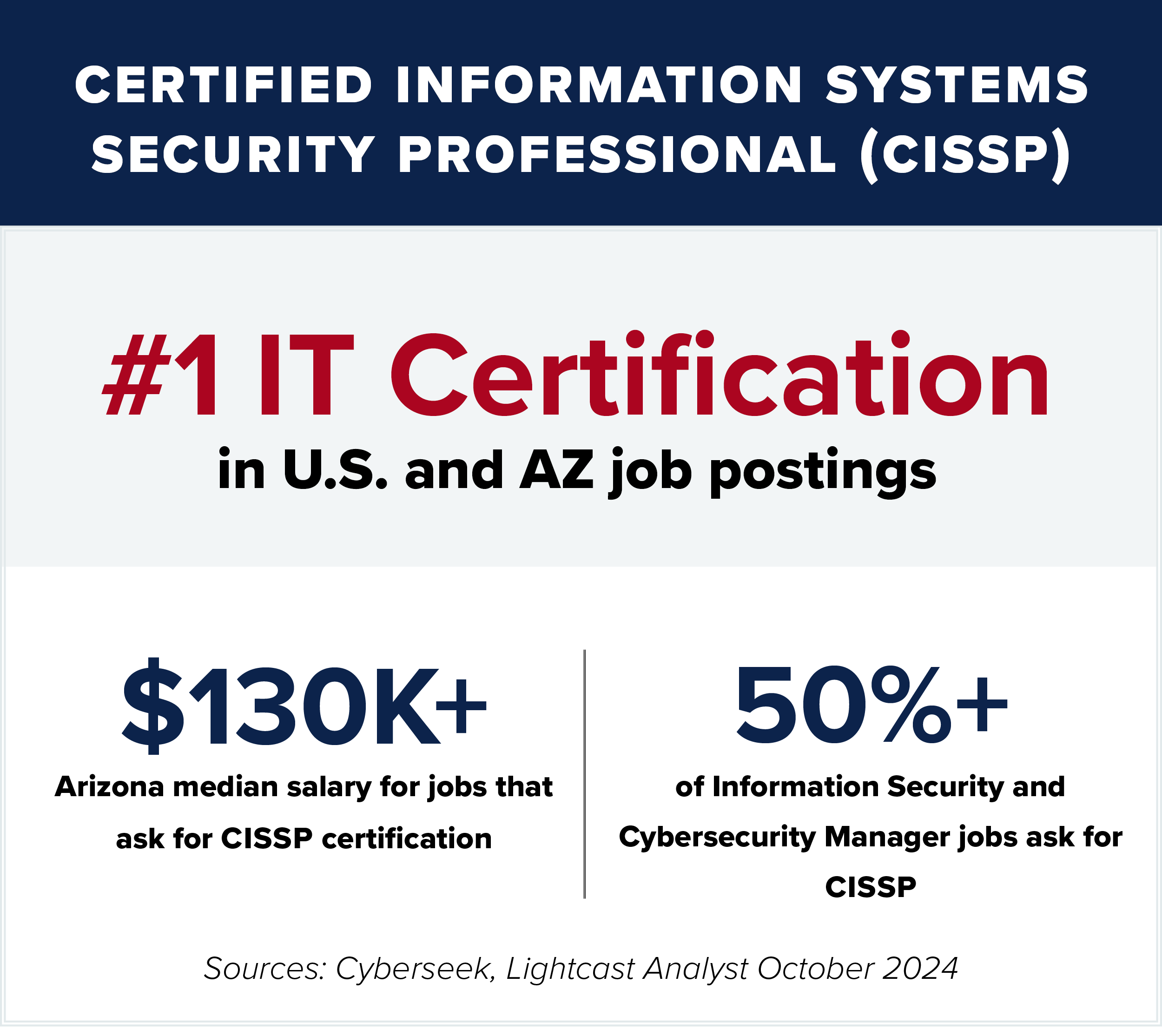
CISSP Certification Frequently Asked Questions
What is CISSP Certification?
Certified Information Systems Security Professional (CISSP®) is an internationally-recognized advanced credential from (ISC)²®, verifying your ability to lead information security programs.
Why should you become a CISSP?
CISSP certification validates that you have the knowledge, experience and skills to be an information security leader.
To earn the certification, you must pass the challenging CISSP exam, document your relevant experience and education, and be endorsed by an (ISC)²-certified professional who can attest to your work experience.
Earning your CISSP certification is therefore a major professional achievement that makes you stand out among your peers.
Certification can also increase your career and salary growth potential.
Is there demand for CISSP certification?
CISSP is one of the most sought-after IT credentials in the world. According to Cyberseek, it was the number 1 most-requested cybersecurity certification nationwide.

Is there demand for CISSP certification in Arizona?
Yes, there is high demand for CISSP certification in Arizona. It was the #1 most-requested IT certification in Arizona job postings in the past year, and more than half of Arizona Information Security Manager and Cybersecurity Manager job postings asked for CISSP certification.
How much is a CISSP salary?
Your salary will depend on your role, employer and location. But the median salary for Arizona CISSP jobs is over $130,000.
(Unless otherwise noted, all the above data comes from Lightcast Analyst, October 2024).
Is the CISSP exam hard?
Yes, the CISSP exam is challenging. The CISSP exam tests you on the eight domains of the CISSP Common Body of Knowledge (CBK®): security and risk management, asset security, security architecture and engineering, communication and network security, identity and access management (IAM), security assessment and testing, security operations, and software development security.
These eight domains cover nearly every aspect of information security.
The breadth of the exam makes it challenging enough. But the real challenge is that CISSP isn't just a technical exam. The exam also tests your critical thinking, decision-making, and information security management abilities.
To pass the exam, you'll need to be able to think like a manager, rather than an engineer or developer.
What is it like to take the CISSP exam?
The exam is a computer-based "adaptive" test, meaning the test gives you different questions based on your correct or incorrect answers to previous questions.
You cannot skip questions and return to them later or change your previous answers.
Because the exam is adaptive, there is no fixed number of questions or exam duration. The exam will include between 125-150 questions and the maximum administration time is three hours (including any breaks the candidate wants to take).
How can I prepare for the CISSP exam?
Our CISSP Exam Prep class can get you ready to pass the challenging CISSP exam.
How much does it cost to take the CISSP exam?
As of October 2024, the CISSP exam fee was $749 in the U.S. Prices may vary in other locations.
How do you become a CISSP?
CISSP is designed for experienced security practitioners.
To earn the certification, you must pass the challenging (ISC)² CISSP certification exam. The exam evaluates your expertise across eight security domains, from security and risk management to software development security.
CISSP candidates must also have at least five years of work experience in two (or more) of the eight CISSP domains. The following can be substituted for one year of the required work experience:
- A degree in information security OR
- An additional (ISC)² -approved credential, such as Certified Information Security Manager (CISM) or CompTIA Security+, CySA+ or CASP
A candidate who does not have the required experience can become an Associate of ISC2 after passing the CISSP exam. They will then have six years to earn the five years of experience required for full CISSP certification.
CISSP candidates must also be endorsed by an (ISC)² credential holder.
Learn more about CISSP requirements.
(ISC)² and CISSP are registered certification marks of (ISC)², Inc.

